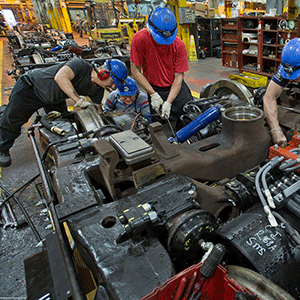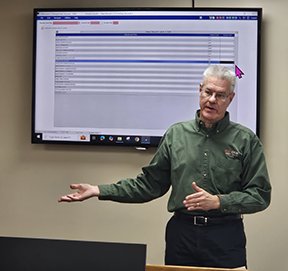Published: January 06, 2014 | Updated: September 15, 2025
Published: January 06, 2014 | Updated: September 15, 2025
7 Common CMMS Software Myths Busted: Separating Fact from Fiction
 In maintenance management, a computerized maintenance management systems (CMMS) stands as pivotal tools. Yet, like any technological advancement, often it gets shrouded in misconceptions. These myths, propagated by various sources—from competing vendors to a lack of comprehensive training—can hinder businesses from fully realizing the potential of a CMMS. Let's dissect seven prevalent CMMS software myths and illuminate the realities behind them.
In maintenance management, a computerized maintenance management systems (CMMS) stands as pivotal tools. Yet, like any technological advancement, often it gets shrouded in misconceptions. These myths, propagated by various sources—from competing vendors to a lack of comprehensive training—can hinder businesses from fully realizing the potential of a CMMS. Let's dissect seven prevalent CMMS software myths and illuminate the realities behind them.
Myth 1: CMMS Software Automatically Improves Maintenance
While a CMMS offers the framework for enhanced maintenance, it's not a magic bullet. Simply installing the software and inputting data won't guarantee improvements. Effective maintenance hinges on the user's proficiency. Your team must become adept at navigating the system, leveraging its reporting and alert capabilities, and ensuring consistent data integrity. Just as you maintain your physical equipment, you must maintain your CMMS database.
The accuracy of your CMMS depends on the quality of the data it holds. Inaccurate information leads to flawed reports. That risks undermining the entire maintenance system. Consider a scenario where scheduled maintenance operates on incorrect equipment run-time data; this could lead to premature or delayed servicing, both of which have negative consequences.
Beyond data entry, you must have active engagement with the CMMS. Regularly reviewing reports, responding to alerts, and analyzing trends allow for proactive maintenance decisions. For example, a CMMS alert indicating a potential component failure should prompt immediate investigation and action, rather than being dismissed.
Myth 2: CMMS Software Automatically Lowers Costs
Cost reduction is a tangible benefit of a well-implemented CMMS, but it requires diligent use. As mentioned above, for example, ignoring critical alerts, such as impending equipment failures, can lead to costly breakdowns and downtime. Preventative maintenance, facilitated by timely CMMS alerts, is essential for avoiding these expenses.
A CMMS empowers a shift from reactive to proactive maintenance. Reactive maintenance, fixing equipment after it breaks. You risk more expensive, emergency repairs and lost production. Proactive maintenance, anticipating and preventing failures, minimizes these costs.
Effective inventory management gives another avenue for cost reduction. A CMMS can track parts usage, identify slow-moving or obsolete inventory, and optimize procurement. This prevents overstocking, reduces waste, and ensures that critical parts are available when needed.
However, you must put in the effort for the CMMS to keep you organized. Suggestions include information about each item of inventory, its location, its classification, and a regular physical count to maintain accurate quantities and stock.
Myth 3: Each Department Needs Its Own CMMS
Implementing separate CMMS systems for each department creates inefficiencies and unnecessary costs. A unified system fosters collaboration and data sharing, leading to a more comprehensive view of maintenance operations.
Multiple CMMS installations incur higher licensing fees, increased training costs, and additional administrative overhead. Moreover, data silos prevent departments from accessing a holistic view of asset performance and maintenance activities.
A single, company-wide CMMS promotes data transparency and collaboration. Departments can access real-time information, coordinate maintenance schedules, and share best practices. This integrated approach enhances overall efficiency and reduces redundancy.
What departments can use the same CMMS as maintenance? Purchasing and Human Resources.
Discover how streamlined maintenance processes can elevate production. Learn more.
Myth 4: A Single Person Can Run a CMMS
While technically feasible, relying on a single individual to manage a CMMS risks disruptions due to illness, absence, or turnover.
Training multiple personnel on CMMS usage ensures continuity and prevents knowledge bottlenecks. Distributing responsibilities across a team also allows for a more comprehensive approach to system management.
CMMS platforms handle a wide range of functions, including data entry, reporting, alert management, and database queries. Delegating these tasks among team members ensures that all aspects of the system are effectively managed.
Myth 5: CMMS Are Only Good for Preventative Maintenance
Preventative maintenance sits near the core of a CMMS, but it's far from the only one. CMMS platforms offer a suite of features, including asset tracking, warranty management, and parts inventory control. As seen above, other departments can use the same systems
CMMS allows for the tracking of asset lifecycles and allows for predicting failures by tracking patterns. This allows a company to plan for capital expenditures, and to know when equipment should be replaced.
CMMS provides a centralized repository for all asset-related information, including key performance indicator reports, equipment readings, and more. This comprehensive view enables informed decision-making and proactive maintenance strategies.
Myth 6: CMMS Software Works for All Situations
While versatile to handle numerous industries, the same CMMS won't be a one-size-fits-all. Different industries and businesses have unique maintenance requirements. Customization and careful selection are essential for successful implementation.
A CMMS designed for construction equipment may not be suitable for an aviation parts replacement company. Understanding your industry's specific needs is crucial for choosing the right solution.
Many CMMS platforms offer customization options and integration capabilities. Tailoring the system to your specific requirements ensures that it aligns with your business processes.
Myth 7: CMMS Is a Waste of Money/Can Be Achieved Via Other Methods
This myth is far from the truth. Even small businesses can benefit from a well-chosen CMMS. Relying on manual methods or spreadsheets is inefficient and unreliable.
CMMS provides a centralized database for maintenance data, eliminating the need for scattered paper records or error-prone spreadsheets. This centralized approach enhances data accuracy and accessibility.
Equipment represents a significant investment. You can read numerous case studies that show ROI benefits of a CMMS.
The assertion that a CMMS constitutes a waste of money often stems from a misunderstanding of its potential. Some businesses attempt to replicate CMMS functionalities using spreadsheets or manual record-keeping. While these methods may seem adequate for small-scale operations, they quickly become unwieldy and inefficient as businesses grow.
A quality CMMS should scale with your business. As your equipment inventory expands and your maintenance needs become more complex, a CMMS provides the necessary tools to manage these challenges effectively. Spreadsheets and manual methods, conversely, often become bottlenecks, hindering growth and efficiency.
Beyond basic record-keeping, a CMMS offers sophisticated data analysis and predictive capabilities. It can generate reports on equipment performance, labor statistics, vendor delivery time percentage, costs, inventory data, and more.
The Human Element in CMMS Success
While a CMMS provides the technical infrastructure for effective maintenance management, its success ultimately depends on the human element. Proper training, clear communication, and a culture of continuous improvement are essential for maximizing the benefits of a CMMS.
 Investing in comprehensive training ensures that all users understand how to navigate the system, input data accurately, and leverage its features effectively. User adoption is crucial; if employees don't use the CMMS correctly, the system's benefits will be diminished.
Investing in comprehensive training ensures that all users understand how to navigate the system, input data accurately, and leverage its features effectively. User adoption is crucial; if employees don't use the CMMS correctly, the system's benefits will be diminished.
A CMMS facilitates communication and collaboration among maintenance personnel, operations staff, and management. By providing a centralized platform for information sharing, it breaks down silos and fosters a culture of teamwork.
Regularly reviewing CMMS data and reports allows for continuous improvement in maintenance practices. Identifying areas for improvement and implementing changes based on data analysis ensures that the CMMS remains a valuable tool.
The selection of a CMMS should be a strategic decision, aligning with the specific needs and goals of your business. Consider factors such as industry requirements, equipment inventory, maintenance workflows, and budget.
Cloud-based CMMS solutions offer advantages such as accessibility, scalability, and automatic updates. On-premise solutions, conversely, may provide greater control over data and customization options. Evaluate the pros and cons of each approach to determine the best fit for your business.
Integration with other business systems, such as enterprise resource planning (ERP) and inventory management software, enhances the overall efficiency of a CMMS. Seamless data flow between systems eliminates redundancy and ensures data consistency.
Choose a CMMS vendor with a proven track record of providing reliable support and ongoing development. A reputable vendor will offer training, technical assistance, and regular updates to ensure that your CMMS remains up-to-date and effective.
The Long-Term Value of CMMS
Implementing a CMMS is an investment in the long-term efficiency and profitability of your business. By enhancing maintenance practices, reducing costs, and improving asset management, a CMMS provides a significant return on investment.
Proper maintenance, facilitated by a CMMS, extends the lifespan of your equipment, reducing the need for premature replacements. This translates to significant cost savings over time.
As mentioned above, proactive maintenance and efficient scheduling minimize equipment downtime. This leads to increased productivity and higher revenue.
CMMS platforms can track safety inspections, maintenance records, and regulatory compliance requirements. This ensures that your business adheres to safety standards and avoids costly penalties.
No Myths About CMMS Success
The myths surrounding CMMS software often obscure its true potential. By understanding the realities and implementing a CMMS effectively, businesses can transform their maintenance operations, reduce costs, and achieve significant improvements in overall efficiency.
MAPCON | 800-922-4336
For more information on CMMS usages, read these articles:
CMMS Helps Gather Information on Motor Performance
Five Commonly Used CMMS Functions
Energy.gov
FAQs
Can CMMS automatically reduce costs?
While CMMS can lead to cost reduction, it requires diligent use of the system. Proactive maintenance and effective inventory management, both facilitated by CMMS, are key to realizing these savings.
Is a CMMS only for preventative maintenance?
While preventative maintenance is a core function, a CMMS offers a suite of other features including asset tracking, warranty management, parts inventory control, and tracking asset lifecycles.
Can one person manage a CMMS for an entire company?
While technically possible, it is not recommended. Relying on a single individual to manage a CMMS can risk disruptions. Training multiple people ensures continuity and a more comprehensive approach.
Do all departments need their own separate CMMS?
No, implementing separate CMMS systems creates inefficiencies. A unified system fosters collaboration and data sharing, providing a holistic view of asset performance and maintenance activities.
Is a CMMS a waste of money for a small business?
No, a well-chosen CMMS can benefit businesses of all sizes, including small ones. It provides a centralized database for maintenance data, which is more reliable and efficient than manual methods or spreadsheets.
Does CMMS software work for all situations?
While CMMS can be used across many industries, a one-size-fits-all approach is not effective. The system should be tailored to an industry's specific needs, and a good CMMS from a company like MAPCON can be customized to suit your business.
MAPCON CMMS software empowers you to plan and execute PM tasks flawlessly, thanks to its wealth of features and customizable options. Want to see it for yourself? Click the button below to get your FREE 30-day trial of MAPCON!
Try It FREE!